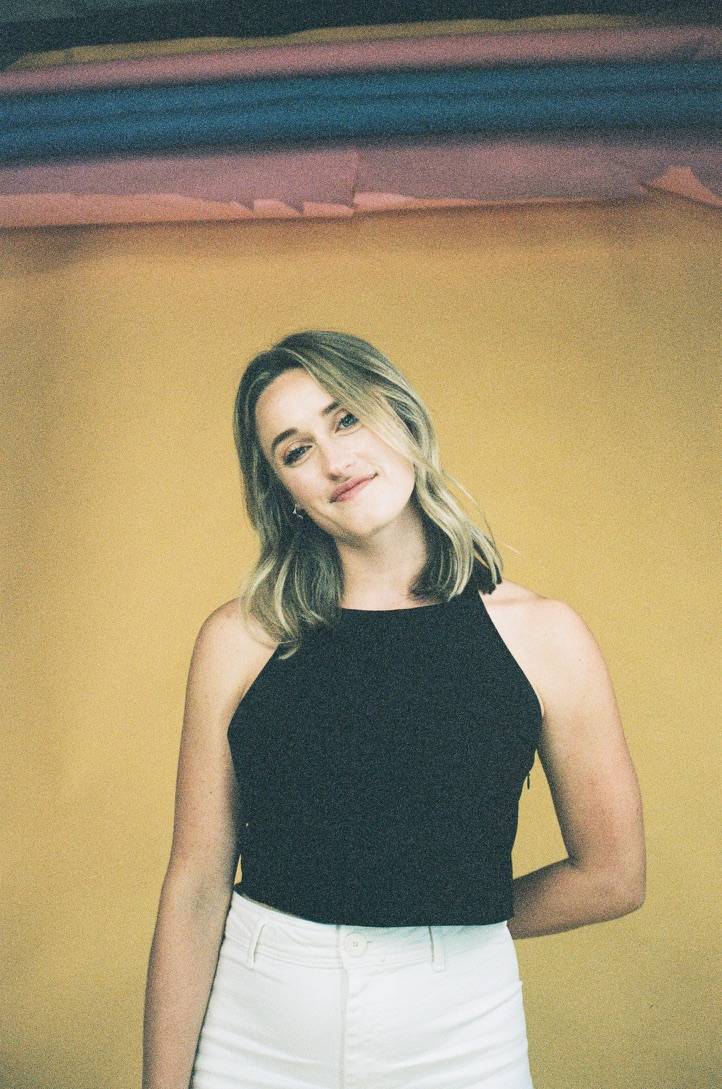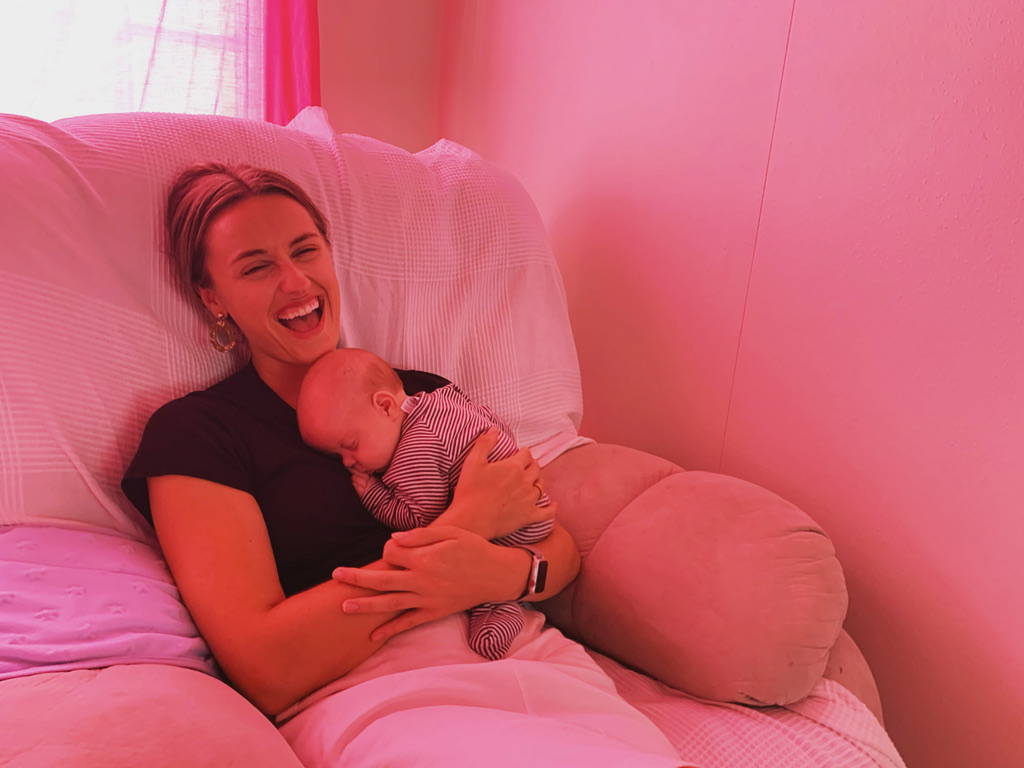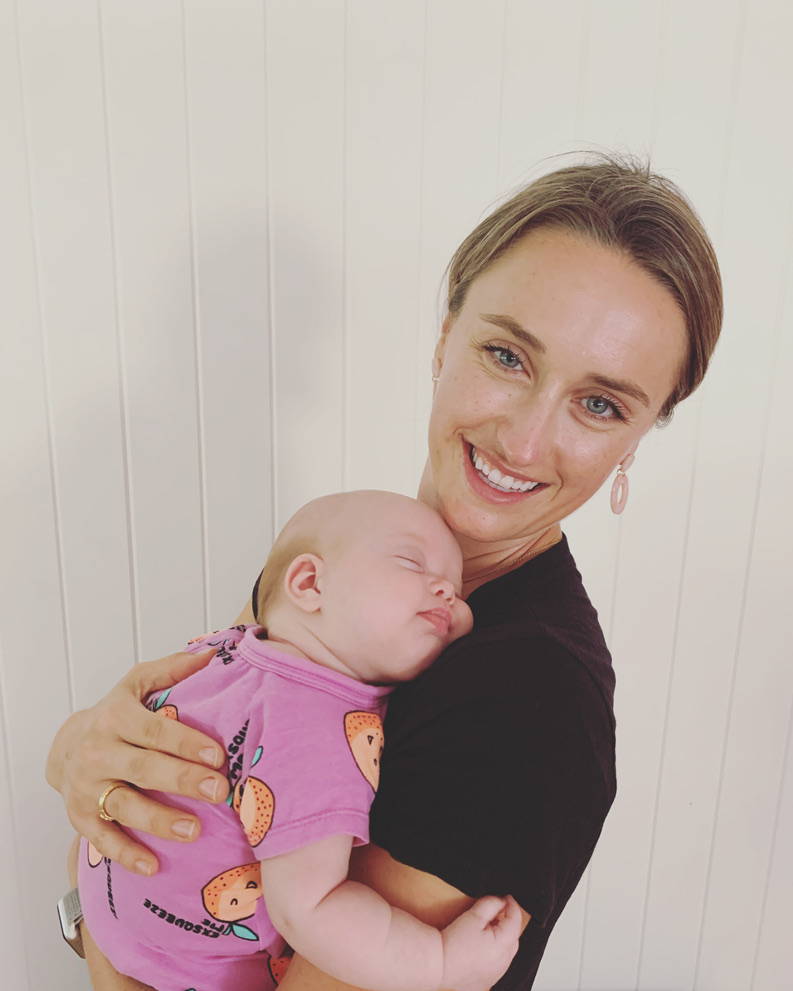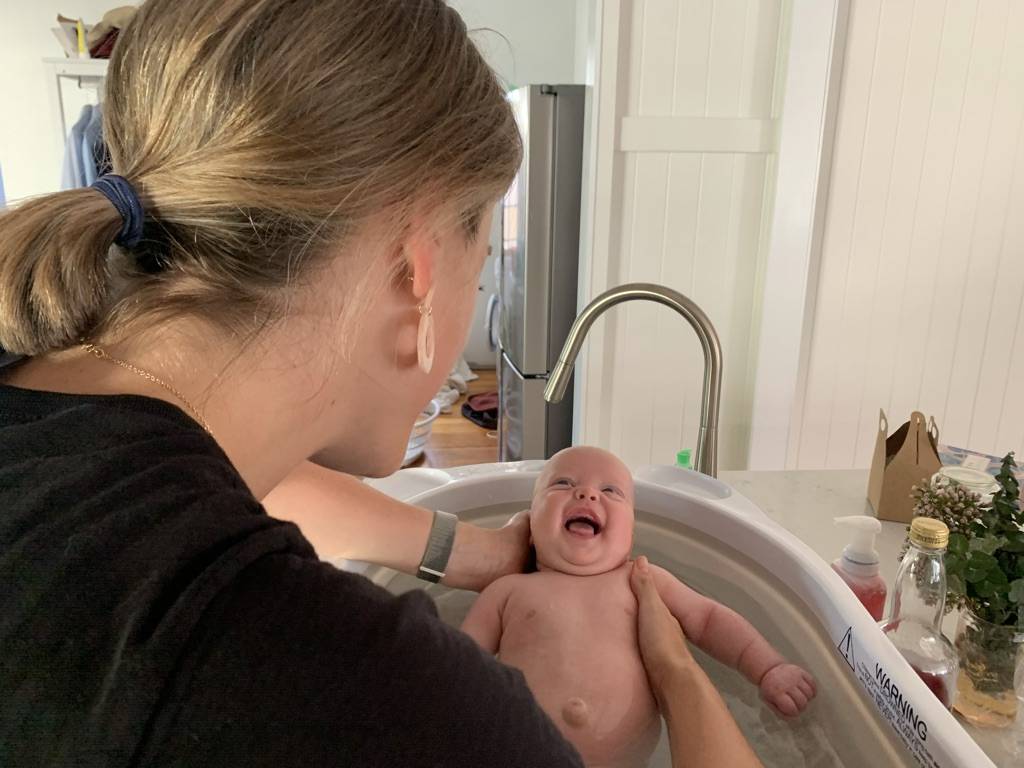Pleasure in the Fourth Trimester with Caroline Reis
Drip founder Hugh Crothers spoke with Caroline Reis about her work as a birth and postpartum doula. Caroline is also co-founder of sexual wellness retailer, flossy, working to highlight brands that are thoughtfully designing products to help change the landscape of the sexual wellness industry.

Thanks for making the time to chat with me today Caroline. So, I think there is an intersectionality of doula work with sexual wellness education and empowerment. Especially interesting seeing your joining us from Seattle, USA, where there have been so many tragedies in this space recently.
I think we're at this massive intersection of rights to bodily autonomy that we assumed – from the moment abortion became legal – were guaranteed rights. With the shock of Roe v Wade being overturned, it seems like this is a real fracture point in the rights that, until now, were protected. I think that the goal of anti-choice people and legislation is to make those fighting for bodily autonomy exhausted. They want us to become so tired that we throw our hands up and say ‘fuck it’. But at this point is when we have to figure out what we need – how do we resource ourselves and figure out what we can do to support our wellbeing – to double down on that kind of stuff so that we don't lose our energy.
What was your introduction into the healthcare space?
I grew up around the hospital system as the daughter of a doctor. After giving pre-med a crack, I went to Physician’s Assistant School instead and spent a lot of my clinical work hours as a kidney dialysis technician. I was working with an incredibly challenging patient population, primarily people with drug addictions and/or were experiencing homelessness in the Seattle area. Three or four days a week, four hours a session hooked up to a machine. It was the farthest, deepest end of the healthcare system. Most patients sat alone, very isolated with little to no support.I would get in trouble for not being efficient enough, spending too much time asking how they were really feeling that day, sitting and chatting with them while they underwent their treatment alone. I realised that I couldn’t imagine spending the rest of my life working within the medical conveyer belt as a tiny Band-Aid within the healthcare system.
I would assume you're dealing with a privileged group of people who can afford or who have considered a doula, but I imagine many would never have heard of a doula before. How did you get into this work?
Knowing I wanted to end up under the umbrella of reproductive rights and sexual wellness, a friend suggested doula work. On a complete whim, I did my doula training. I walked into the room, and it was full of beautiful empaths who were so passionate about the non-medical type of support I felt drawn to.. And yes, there are a lot of the people who need doula support but unfortunately, most aren't able to afford it and insurance only covers doula support in three states officially in the US.

I remember watching a video of an egg being released from an ovary, going down the fallopian tubes and then being implanted into the wall of the uterus lining. It was set to the most gorgeous opera music. I just remember sobbing in this lecture hall with 200 other people thinking how profound reproductive anatomy is. I've really been fixated on this space from that point.
What's the process around engaging a doula?
It’s slightly different in Australia but there are many different types of doulas with specificity in who they support. There are people that work specifically with teen mums – there's an amazing black doula collective in the USthat supports black and brown families. I've had clients hire me as early as 20 weeks and I've also had people reach out two days before their due date. The Doula Network of Australia is a database of doulas. A lot of doulas have their own individual business too so if you Google “doulas near me” you should have some luck.
The most important thing when engaging a doula is making sure that your energy aligns with the theirs. They could have 100 different credentials, but if you don’t envision them at your birth or in your home, they’re likely not the right fit. Through the Australian Doula College you can look for doulas as well as hire student doulas who have much lower fees because they are still in training. They most experienced and specialised doulas can have fees up to $3,500.
After you’ve found the best fit for yourself, usually, it's a flat fee based on a set amount of meetings before/after birth. For example, most doulas will have two prenatal meetings (two hours-ish in duration for each meeting) and then they will be on call from two weeks before your due date,up to two weeks after. I'm essentially on call for the whole month carrying my doula bag around!
What does life look like for you during this time?
I'm don’t go out of service, and I don’t travel more than two hours away from the location of the birthing person to make sure I can get there in time. Being on call is incredibly exhausting which is why I’ve gotten more into postpartum support as of late. The hourly breakdown for being on call for a month ends up being like 10 cents an hour. You're really paying for that person to be available when you need them.
It sounds like having like security at a party! Of course, you would hire security if you're going to have a big party because you’re going to be able to enjoy the party knowing everyone’s safe.
Security mixed with a tour guide, who has been to a location before and can tell you about the sites and knows what to look out for. Often, I’m there to support the partner if there is one involved. I'm there to make the partner look good, because I don't have the same intimate relationship with the birthing person like the partner does. I love getting to support the unique intimacy that between the partner and the birthing person in the birthing space. I might say things to a partner like “it might feel good to give her a little bit of a massage – do you want to try that?” or, “remember – we talked about how she really likes this specific kind of touch?” This kind of prompting can help ease feelings of overwhelm for partners so they can better support the birthing person instead of spending their time googling things that may be taking them away from being present in the experience.
It makes total sense, it’s a surprise it’s not more common.
I dream of a world where doulas are paid for by the Government. From the moment you find out you are pregnant it's then an easy match process with a doula or doulas who can be your guide, through birth, postpartum and beyond. I've never had a client who has said doula support wasn't worth it. When I come to the postpartum visit, often clients say, “I don't know if I could have done that without you.” We have a moment to chat, and they are so thankful.

I’m interested in learning more about the ‘fourth trimester’, particularly around pleasure and reconnecting with sex in yourself and your body. Do you have any experience in this space with the actual childbirth process – pleasure during birth and chest feeding for the first time? I think there is inherent and unspoken-about pleasure and eroticism in that. But people don't want to talk about it.
When I was in my doula training, I remember learning about one doula in the Seattle area who’s doula bag was full of sex toys, and different vibrators. At the hospital, it was the best way to get all of the providers and nurses out of the room! She would whip out her doula bag and start putting products onto the hospital tray table.Then she would exit for a little bit and let them explore however they wanted to.
What strikes me about this is how women and people with uteruses spend most of our lives trying not to get pregnant and then once we do get pregnant often the relationship to sex and pleasure changes. . It’s often separated from the experience of birthing when really it’s just as continuation on the same journey of someone's entire sexuality and experience of pleasure. Ironically, birth and orgasm follow the exact same hormone trajectory.
There's a study from the National Institute of Health that talks about how genital stimulation can actuallydecrease pain thresholds. When we are able to open up our experience of pleasure during pregnancy and into birth, it actually causes the oxytocin to increase, which makes labor contractions more productive. When we keep ourselves in this space of oxytocin flowing, everything is more calm, and baby's able to come down and press on the cervix with more effectiveness. People talk about orgasmic birth which is really this experience of heightened intensity and almost euphoria instead of pain during labor because of getting to such a flow state of oxytocin and connectedness with body.
What really gets me excited is supporting the reproductive journey through physical, emotional, and information through my work as a doula, as well as sexual wellness education and empowerment through flossy.
What else do you coach around?
Rhythm is a big thing that we enourage in the birthing space.. When people get out of rhythm, their breathing changes and they feel aloss control which takes them out of their body. Getting to a flow state withcontractions can actually lead to this elevated orgasmic birth experience because they are so in tune with their body.
I often encourage clients to find this connected with body before baby arrives in the weeks and months before birth., Exploring small things during the day make you feel good. Is it taking a bath and listening to hypnobirthing tracks while you partner gives you a massage? Finding rhythmic cues like this that can be carried over into the birthing space is a great way to prepare. Rhythm keeps the pathway to pleasure and oxytocin open.
You're contributing to people's lives in such a profound way in this very intimate, unique moment that they may only have once in their life. In your role as a postpartum doula, what does your work reconnecting mothers with pleasure look like, considering how common birth trauma can be?
Given that roughly one third of birthing people experience birth trauma, support is so necessary. Birth trauma is any time someone feels intensely afraid, out of control or helpless when reflecting on their birth experience. It’s on the rise with higher rates of intervention (such as caesarean section, induction etc).
The biggest first step, before we can even think about any kind of pleasure, is processing any traumatic experiences. You can’t move to a place of thinking about what might feel good or thinking about reconnecting with your body if you are still in trauma response. When I first come to a postpartum client's house, often I sit with them, make a cup of tea or warm milk with cinnamon and honey and we sit and talk about the birth. What was it like – what kind of emotions come up when reflecting on the birth? I often try to integrate the partner into the conversation (if they have one) because partners can experience secondary traumas from the experience. Sometimes its takes three visits of spending time and talking about that and healing.
The general rule of thumb of waiting four to six weeks before engaging in any physical pleasure must be unattainable for so many new parents?
Most of the time it takes far longer than that. I have a client who is seven months postpartum and experienced a fourth degree tear and vaginal prolapse. She just reached out to me and asked, “When do I think I’m going to feel normal again and be able to enjoy sex?” She feels so afraid to even have anything close to that area, let alone to find any pleasure in the experience. We had a long conversation about expectations and understanding that it will never be the same as it was pre-baby. These are often overlooked conversations when doctors are clearing people at four to six weeks.
After initial healing (which is an ongoing, lifelong process), I encourage clients to explore pleasure beyond just sexual. We explore questions like “what does pleasure look like for you today, this week or this month?” I like to discuss pleasure through the senses, asking, “what senses do you experience the most pleasure through?” Maybe it’s simply leaving the house for five minutes and smelling the air outside.. Do you love lighting a special candle? Eating nourishing foods? From there I can focus on how I can support their pleasure journey – keeping the house clean and lighting a candle – making them food – holding the baby while they go for a walk. The most important thing is helping them rediscover what pleasure looks like for them in this new phase of their journey.

The fact there is also a screaming baby around you during this time adds a barrier. Is there a sense of privilege in being a part of this stage of someone’s life as a person without children?
I couldn't agree more. I often feel the impostor syndrome as I go into someone's house. Because I've never had a baby of my own.They're trying to manage all the things - feeding their baby, dealing with healing and recovery, juggling dinner and perhaps there’s a kid screaming in the background.. All of this stimulation and stress causes cortisol to spike, thus making it even harder to keep up milk production if they are breast or chestfeeding which means the negative feedback loop continues. So what I try to do in supporting is take away even one or two of those stressors so they can have even one moment to breathe and reconnect with their body.I had a client leave for 20 minutes to go run errands and she said she had “never felt freer in her entire life”. It's the micro moments of pleasure that are key, no matter how small.
When new mothers can work through the psychological side of recovery, how does the body follow?
Often clients don’t always feel comfortable opening up to me about sex and pleasure…until I bring out lube! I bring all of my postpartum clients a really quality lubricant (like Drip’s water-based lube!) and if they mention any pain, I often suggest a wearable penetration bumper like Ohnut. Ironically, in my doula training, there were almost no doulas who mentioned talking to clients about sex and pleasure. It’s like suddenly because there’s a baby, it takes sex and intimacy off the table.
After exploring pleasure through the senses, it’s about starting by exploring with solo pleasure and reconnecting with yourself before even thinking about engaging with a partner. Some people don’t even want to go near their c-section incision, let alone touch their vulva or feel what's going on down there. Maybe your nipples used to be highly pleasurable for you and now they are used eight times a day for feeding a newborn. It can rewire the pleasure pathway. It is a slow process of self-pleasure and exploration to properly understand what feels good in their body after this hugely transformative experience. There's also this big piece around touch fatigue. If you are breast/chestfeeding eight to 12 times a day while other kids are running around and need you, you might feel a strong aversion to your partner trying to touch you intimately.
Taking the partner out of the equation and first just recalibrating with your own body to explore what feels good to you can be hugely important. Maybe you want to keep a journal to write down or almost map out this new version of you and how you experience pleasure.
After solo exploring, it might feel right to involve a partner using the same ultra-slow process that involves doubling down on communication. Discussing your expectations and where they may or may not align, getting to understand what feels good for each of you uniquely, and if there are certain things that you don’t feel ready for. It’s all about defining the guardrails of your new sexual selves after having a baby. A client shared that she used to be so “kinky” and loved having sex all the time but it feels so different now. It takes time to grieve your former sexual self – not that it will never come back, but to let go of the expectation of if/when it will be bounce back to how it previously was. We all have the joy of getting to continually define (baby or not!) how our pleasurable selves show up in the world – how exciting is that?!
You can find Caroline's sexual wellness site www.feelflossy.com or follow them on Instagram here.
You can also find Caroline's Doula Instagram account here.


